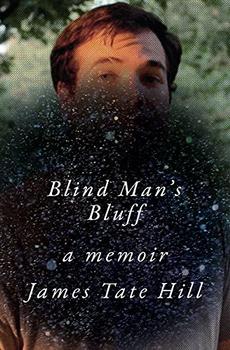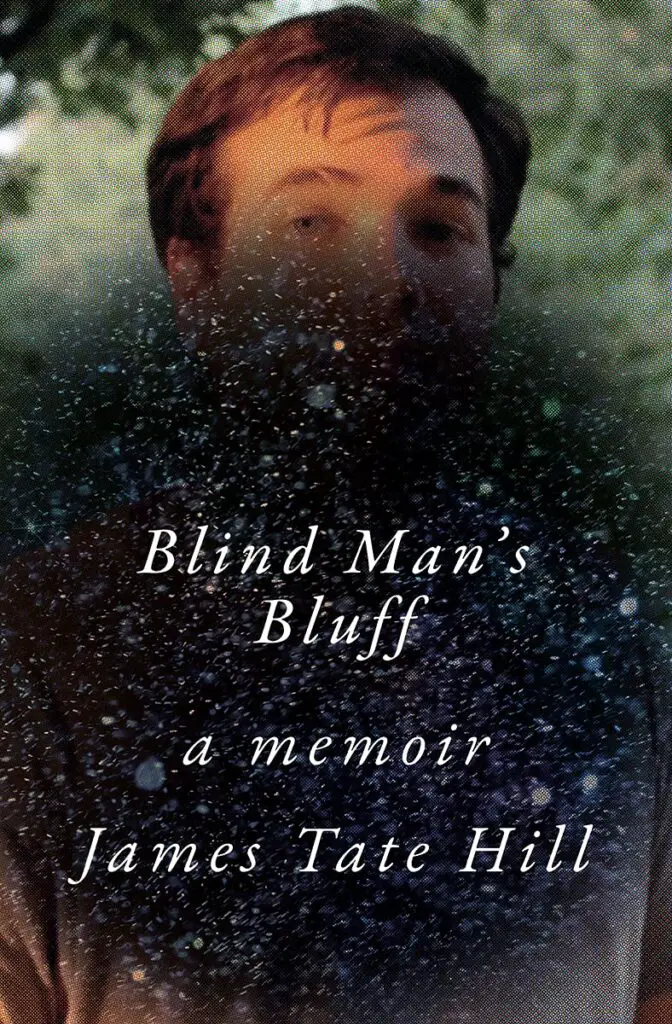For this LitStack Rec, we’re revisiting James Tate Hill’s engaging and unique memoir, Blind Man’s Bluff (2021). We’re anticipating James’ next book, and in the meantime, we’re enjoying his column at Literary Hub on audiobooks, which you can read here.
Revisiting Blind Man’s Bluff: a Memoir, by James Tate Hill
Table of Contents
A struggle tempered with a wry and candid voice
“I wasn’t a big fan of the label legally blind,” James Tate Hill writes in his terrific new memoir, “but that’s what I was. The word disability, no less accurate, seemed even worse.” Hill’s admission comes early in Blind Man’s Bluff, and in the book’s trademark wry, candid, and slightly deprecating stance. Hill tells his story with both wisdom and a storyteller’s knack for suspense, both of which make Blind Man’s Bluff a page-turner filled with heart. It’s also a coming-of-age story, a bildungsroman of creative writing and academia, a love letter to books and pop culture, and a history of and testament to the power of audiobooks.
At age sixteen, Hill was diagnosed with Leber’s hereditary optic neuropathy, a condition that left him legally blind, a diagnosis that upended his life. His plans for driving his new Mustang, for dating, college, and pursuing the field of medicine, quickly vanished. When he’s told by a Johns Hopkins ophthalmologist there’s no treatment, and what little vision he has left will be peripheral, the search for treatment takes Hill to Tokyo for a medication not yet approved in the States. And his sight continues to worsen.
As his prospects and sense of independence dwindle, resisting the label of legally blind, Hill considers the alternatives: “I auditioned euphemisms for legally blind, my favorites being ‘bad eyes’ and ‘vision problem.’ I liked the former for its air of blasé, the latter for its ambiguity.”
Resisting the label of legally blind
The struggle is set against Hill’s perceptions of self and sharp sense of humor (he has an expert sense of comedic timing and tone). Central to the book is Hill’s desire to pass as sighted—at college, in class, at parties, on first dates, and grocery shopping. “If I look up or to the side, I can see something, and this usually fends off further questions.” But hiding the truth proves exhausting and dangerous. Unwilling to use a cane, he has more than a few scary near-misses crossing streets—daylight is far riskier than darkness: in the dark headlights are easier to see.
Everything happens for a reason, people liked to tell you
— James Tate Hill
when your vision began to go.
You wanted to believe them, but there’s a fine line between
looking for a reason and blaming yourself for going blind.
And blame himself he does—as an undergraduate at West Virginia University, and later, a graduate student in a creative writing program—hiding his blindness from his friends, colleagues, and girlfriends, careful never to reveal what he can’t see. “‘Wow, I never knew,’ friends sometimes said upon learning I was legally blind, and I’d swell with pride, thinking of all I had managed to conceal.”
It’s impossible not to feel empathy for Hill, and the struggle that consumes his life. He memorizes the words of things the sighted take for granted: restaurant menus and the position of buttons on elevators and microwaves. He uses outsized fonts to type his stories and is always the first to arrive at a meeting or date to avoid having to search out a face he can’t see. Cooking requires more taste than sight, he tells us, but without help shopping for groceries, when there’s nothing in the house to eat, he skips meals. The passages that detail these episodes are heartbreaking, and even more affecting in the emotional accuracy of Hill’s prose.
A shadow existence, then wisdom
In graduate school, he meets Meredith, a poet. She reads labels for him at the grocery store and fills in the gaps he can’t see. But “within weeks of our shopping together, the supermarket had become the same crucible in which my last relationship crumbled.” They later marry, and when Meredith begins to experience her own health issues, the marriage is strained by the needs of both. With his marriage falling apart, and two unpublished novels, the world grows smaller. Hill isolates with audiobooks, music, and television—a shadow existence lived in an emotional half-light.
For Hill, the reality of blindness is at the core of this memoir, but blindness is also a metaphor and a state of mind. “Blind, after all, is a common synonym for ignorant,” he writes. In this memoir of seeing and being seen, Hill reckons as much with the perception of blindness as the condition itself. Late in the memoir, buoyed by a new relationship, he comes to an understanding. “Wisdom, it turns out, is acknowledging where I cannot go without help. Asking for help means I will never be independent, but how many of us truly are?”
About James Tate Hill
James Tate Hill is a graduate of the creative writing programs at Hollins University and the University of North Carolina Greensboro. His fiction has appeared in StoryQuarterly, Sonora Review, The Texas Review, The Laurel Review, and elsewhere. He is the fiction editor for the literary magazine Monkeybicycle, and a contributing editor at Literary Hub, where he writes a monthly audiobooks column. The Best American Essays has chosen two of his works as Notable, and he is the recipient of the Nilsen Literary Prize for a First Novel for Academy Gothic, published in 2015.
In his New York Times review of Blind Man’s Bluff, Dwight Garner wrote, “As a genre, disease and illness memoirs are permanently interesting if honest and sharply observed.” Near the end of the book, Hill recounts his method of revision for his creative writing students: “Let’s break down the word, you say, drawing a slash between Re and Vision. You’re trying to see what you’ve written a second time, see it with fresh eyes, as you haven’t seen it before.” It’s a beautiful metaphor for the reckoning he’s undergone, in both art and in life.
— Lauren Alwan
Books by James Tate Hill
Other LitStack Resources
Be sure and check out other LitStack Recs and LitStack Reviews, and be sure and read more intelligent and insightful articles by Lauren Alwan. All on LitStack—what you should read.
As a Bookshop, Amazon affiliate, LitStack may earn a commission at no cost to you when you purchase products through our affiliate links.



